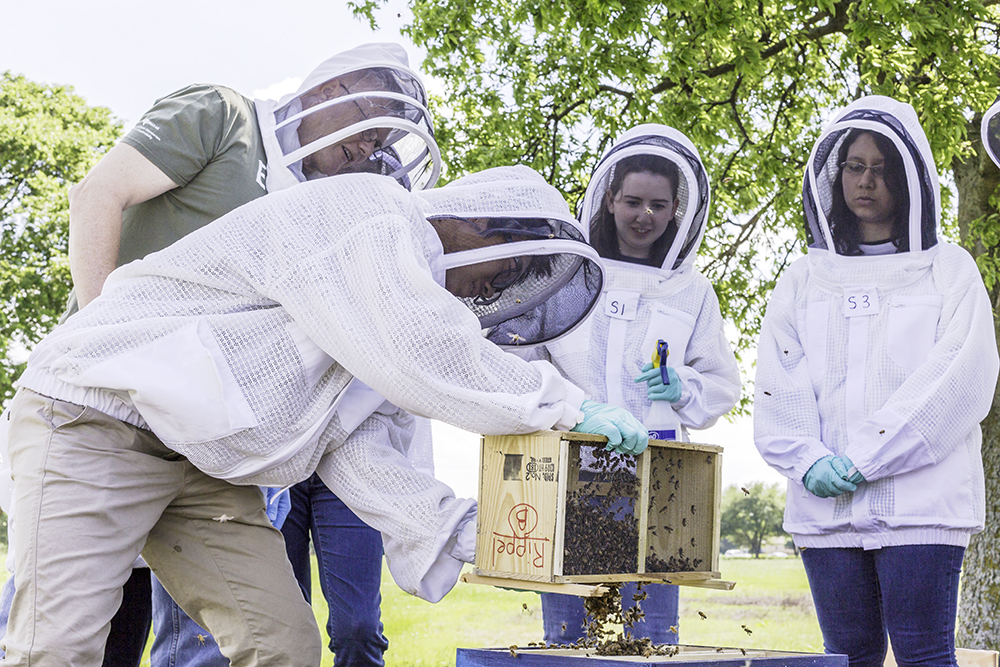Senior Lecturer Dr. Scott Rippel MS'96, PhD'99, established a micro-apiary on campus to help introduce other students and volunteers to the pollinators, which include not just bees but also Monarch butterflies. If you don't see the video, watch it on Vimeo.
Dr. Scott Rippel MS'96, PhD'99 has a honey of a deal for students at The University of Texas at Dallas.
This fall, the senior lecturer is teaching Honey Bee Biology, a survey course where biology undergraduates learn about the insect’s biology, behavior, social organization and role in the environment and agriculture. Students in his class get hands-on experience with basic beekeeping in the campus apiary, including maintaining the colonies and harvesting honey.
Rippel, a decorated U.S. Army veteran, had no formal experience as a beekeeper before teaching the course. He earned both his MS and PhD in molecular and cell biology from the Department of Biological Sciences in the School of Natural Sciences and Mathematics and has been teaching since 1999.
It was a student that helped inspire Rippel to start the pilot class on honey bees for majors in the biology department in 2012. Since then, the class has always been full.
“I was just always intrigued with honey bees,” he said. “My grandfather had a couple of hives when he had an orchard in Pennsylvania. One day in 2011 a student in one of my classes who had raised bees came in and said, ‘Hey, you wanna see something cool? There’s some bees out here on campus.’ It was an open hive on a log, and I was just enthralled with it.”
In 2012, Rippel worked with Facilities Management and the Office of Sustainability to develop an apiary on campus for his students to get firsthand experience working with bees, not as a beekeeping class, he said, but as a “side note” to teaching about the superorganism of the honey bee.
As pollinators, honey bees contribute more than $14 billion annually to the U.S. agriculture industry, pollinating more than 100 commercial crops, according to the U.S. Department of Agriculture. Around the UT Dallas campus, the bees gather nectar from plants such as Indian blanket, Queen Anne’s lace, canola, horsemint, aster and goldenrod. Rippel said each plant contributes to the flavor of honey, much like different grape varieties create distinctive wines.
Earlier this year, the campus added a micro-apiary with the help of a gift from Nature Nate’s, a honey company based in McKinney, Texas, to the Hobson Wildenthal Honors College. The micro-apiary helps introduce other students and volunteers to pollinators, which also include Monarch butterflies. In addition, Rippel and senior lecturer Dr. Christina Thompson oversee an honors college reading class on honey bees and society.
As part of UT Dallas’s sustainability efforts, coordinated by the Facilities Management, an 8-acre area on the southwest corner of the campus is a no-mow zone that encourages the growth of native prairie grasses and plants. Throughout campus, the grounds team plants pollinator-friendly species and maintains habitats in the landscaping, including Monarch waystations. The flora provides breeding grounds and food sources for native pollinators, supporting their crucial role in maintaining flowering and food-producing plants.
“If you can protect one species of insect, it will have a benefit for others,” Rippel said. “It becomes a synergistic effect. We have planted butterfly bushes on campus that are just covered with Monarchs as they migrate. But those bushes are also a source of nectar for honey bees.
“It comes down to habitat. If you have the right habitat, build it, and they will come.”
